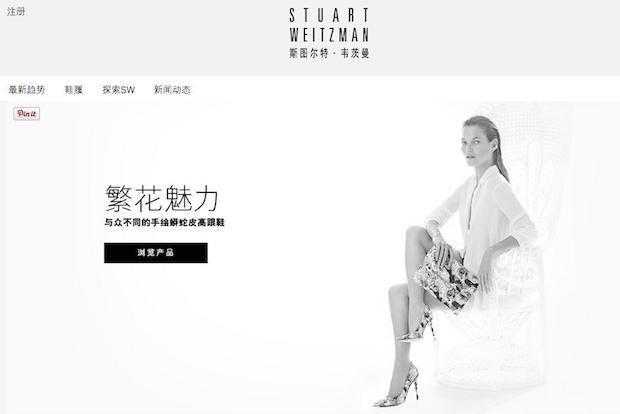
Stuart Weitzman's Chinese site.
Coming off a strong 2014 in China—where its accessible luxury image has helped the brand sidestep the ongoing anti-corruption crackdown—this week it was reported that Coach has agreed to purchase American high-end footwear brand Stuart Weitzman. The deal, valued at an estimated $574 million, is expected to help Coach branch further out into new businesses and tap a broader base of consumers.
But beyond the immediate boost Coach will get from the popular Stuart Weitzman brand in key markets like the United States, the deal will likely have a strong impact on Coach sales among Chinese consumers both at home and abroad. Already, Coach stores and outlets are some of the most common stops for Chinese tourists in the United States, and the brand remains extremely popular among younger women and men in the 25-34 age range—yet their purchases tend to be heavily weighted towards handbags rather than apparel.
Among outbound Chinese shoppers, footwear has become an important emerging segment, with brands like Stuart Weitzman some of the most popular when visiting New York in particular. Within China, Stuart Weitzman has a far more high-end image, mostly due to the brand’s brick-and-mortar strategy, which has entailed opening stores at luxury malls such as Shanghai’s Jing An Kerry Center and luxury hotels like the Peninsula Beijing.

A Coach ad featuring Chinese supermodel Liu Wen.
This has—so far—been arguably a weakness for Stuart Weitzman in mainland China, as foreign footwear brands continue to struggle with high costs, the anti-corruption crackdown (and the subsequent lessening of purchases at said luxury malls), and simple consumer perceptions. According to a study last year by Mintel, 40 percent of Chinese (domestic) shoppers feel that local luxury footwear brands are just as good as foreign imports, with 16 percent of the belief that Chinese brands are better.
Facing difficulties in getting consumers excited about foreign footwear brands, Stuart Weitzman will have a far easier time under the wing of Coach, which, since entering the Chinese market in 1998, has proven to be one of the most China-savvy brands in the world. Despite the threats of growth stagnation and brand fatigue, Coach has proven time and again to be highly adaptable and adept at tapping the right influencers and celebrities, and tweaking marketing efforts to suit market conditions. While some efforts—such as Coach’s somewhat ill-fated Tmall experiment in 2011—fell flat, others, like its “Hot Moms” and “New York Look” campaigns in 2013 were social media success stories.
Leveraging Coach’s vast China network, we may see a renewed marketing push in the second half of 2015 by Stuart Weitzman, which may involve the same smart strategies in China—as well as a stronger effort to tap China’s e-commerce and outbound tourist-shopper segments.
Avery Booker is a partner at China Luxury Advisors.
